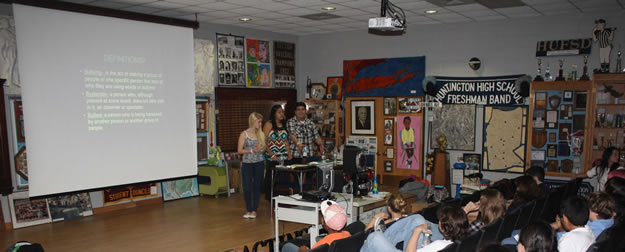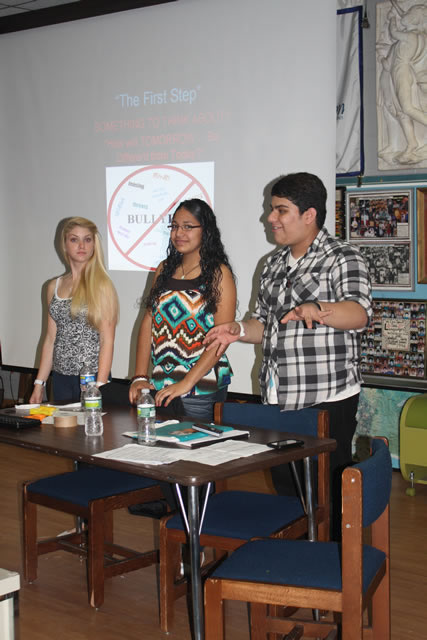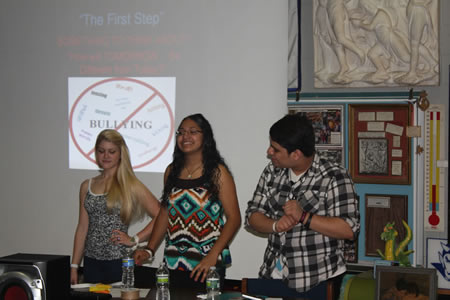Anti-Bullying Assembly
Pulls No Punches

The phrase "hard-hitting" doesn't do true justice to just how powerful a Huntington High School anti-bullying program was at times. In small session assembly programs held in the School Heritage Museum over a two-day period, a group of three teenagers stood on a stage and gave a hard-hitting presentation to their peers.
Sophomores Erica Negrete and Joshua Stickell and junior Hannah Rice pulled no punches during their presentation, which captured the undivided attention of students in the audience and brought several to tears.
 "I am so proud of the three presenters," Principal Carmela Leonardi said. The need for the anti-bullying presentation was made clear last month. There were two fights involving girls during a one-week period.
"I am so proud of the three presenters," Principal Carmela Leonardi said. The need for the anti-bullying presentation was made clear last month. There were two fights involving girls during a one-week period.
"The situation was made worse by the rumors going around about who was at fault, who was actually involved and by the extended gossip that was created on Facebook," Dr. Leonardi said. "The gossip created another fight among the Facebook girls. This fight took place in town during the long [Columbus Day] weekend."
Ms. Negrete, Mr. Stickell and Ms. Rice visited with Dr. Leonardi and asked "to address the student body about the kind of name calling and harassment that leads to fights and to students hurting others or hurting themselves," the principal said. "They felt that students in our school would listen and do whatever it takes to improve school climate."
The trio spoke with music teacher Veronica Escamilla Mainville and department director Joan R. Fretz about the possibility of having the chamber choir sing during a portion of the assembly "and then submitted to me the information they wanted to share," Dr. Leonardi said. "We worked together until we agreed on the final format, sequence and content."
 Students attended the presentation during their regularly scheduled English class. The presentation included definitions of terminology, statistics and real-life scenarios involving bullying, which takes the form of much more than just pushing, shoving or threatening words.
Students attended the presentation during their regularly scheduled English class. The presentation included definitions of terminology, statistics and real-life scenarios involving bullying, which takes the form of much more than just pushing, shoving or threatening words.
In the run-up to the assembly programs, the three presenters surveyed Huntington students and used the findings to create a cross-sample of all grades, which was then compared to New York State schools as a whole.
New York is second to only California in bullying incidents. The presenters asked their audience to think about "How will tomorrow be different from today?" Students were challenged to stop their own negative behaviors, be a voice against others who might be bullies and to seek help when in the midst of a destructive situation.
Perhaps the most powerful segment came when the three teenagers spoke at length about their own real-life harassment stories. "They spoke from their hearts and they appealed to their schoolmates to 'take the first step' and end all forms of bullying by not being a bystander or instigator," Dr. Leonardi said. "It was informative and moving, especially when it culminated in the poem Erica wrote and the singing of 'We Are The World' by the chamber choir."
English teachers were asked to allow students to offer their impressions about the program and suggestions for future ones. A majority of respondents "felt that it was brave of the three individuals to do what they did and appreciated being able to discuss such a serious topic," Dr. Leonardi said.
Among the suggestions were to have more group discussions on the topic; select a group of "popular" kids to befriend other students who could be at risk of being bullied; wear some symbol, such as a colored bracelet, that indicates bullying is not condoned.
"A smaller number of students felt that no amount of talking would change anything and that we should just suspend the bullies," Dr. Leonardi said.
There is general agreement that the program initiated a much-needed conversation on the topic and that the discussions were fruitful.
